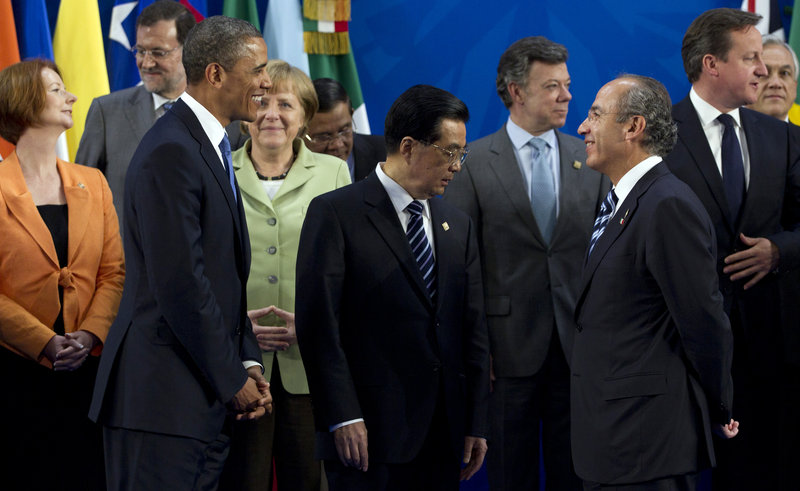LOS CABOS, Mexico — President Obama says European leaders ‘grasp the seriousness’ of their debt crisis and are moving with ‘heightened sense of urgency’ to find a solution.
In a news conference following a G-20 economic summit, Obama said the economic problems in Europe won’t be solved by the G-20 or the United States, but by European nations.
He said he was confident they could do that, but acknowledged the difficulty of getting all the separate legislatures to agree.
Leaders of the world’s other established and emerging powers wanted something from Obama, too – an assurance that the U.S. economy won’t plunge into an abyss at year’s end, when tax hikes and big spending cuts are due to kick in unless lawmakers and the White House cut a deal.
All sides at the Group of 20 summit seemed intent on sending confident signals to jittery markets and unhappy electorates. The European mess of high debt, high borrowing rates and high unemployment poses huge spillover risks to the American economy.
Underscoring the stakes, Obama broke from the main summit Tuesday for a brief meeting with leaders from Britain, Germany, Italy, France, Spain and the European Union.
Obama also met privately Monday with German Chancellor Angela Merkel. Following their talks, he sent word through a spokesman that he was “encouraged” about Europe’s path.
Merkel proclaimed that the European Union nations were determined to solve the crisis through debt cutting, growth and cooperation.
She told reporters that the European leaders present made a unified statement that they were willing to tackle their problems.
“From the side of the European Union we argued unanimously and collectively that we are determined to solve the crisis, and to do it in a mix of fiscal consolidation, growth initiatives, and deepening of European cooperation,” Merkel said.
A senior Obama administration official said Tuesday that European are pursuing “more forceful response” than they have contemplated to date. The Obama official said the European strategy will be based around building more viable financial institutions over time but also economic growth measures in the short term, a step Obama has been urging for some time.
Still, European leaders were showing flashes that they have heard enough about their troubles, particularly from Americans. Memories linger of the 2008 financial crash that was borne in the United States and destroyed jobs and wealth.
“The eurozone has a serious problem, but it is certainly not the only imbalance in the world economy,” Italian Prime Minster Mario Monti said Tuesday. He said the United States’ own financial problems were mentioned in G-20 talks “by almost everybody, including President Obama.”
Obama said all countries must contribute so “the economy grows, the situation stabilizes, confidence returns to the markets.”
Central to the G-20 debate is how nations can boost jobs and consumer demand without sinking deeper into debt. Obama has implored governments to spend and grow, not just cut.
A draft of the leaders’ final statement shows they want assurances that the United States won’t take a deep plunge and drag them down as well.
The statement says the U.S. will “calibrate” its attempt to rein in debt and spending “by avoiding a sharp fiscal contraction in 2013.” That’s a reference to a big threat to economic growth in the United States after the November election: the expiration of George W. Bush-era tax cuts and a scheduled round of automatic spending cuts that could send the nation back into a recession.
While the White House and lawmakers agree that they must act late this year or early next year to avoid such a “fiscal cliff,” there is no path yet on how to avoid it.
Obama’s political move has been to show confidence in Europe’s ability to solve its problems, but prod its leaders to move and chide them for not doing more sooner. Now, White House aides talk more positively about the direction of the debate, as they see it, toward the role of government in spurring economic growth.
“I think if you look at the shift in the focus, you’ll see a very strong focus on supporting demand … recognizing that economic conditions have deteriorated,” said Lael Brainard, the Treasury Department’s undersecretary for international affairs.
“This is very important to the Europeans in particular,” she said. “And yes, we have heard it from German colleagues.”
European leaders plan to release a more complete response to the financial crisis during a summit next week in Brussels.
Send questions/comments to the editors.



Success. Please wait for the page to reload. If the page does not reload within 5 seconds, please refresh the page.
Enter your email and password to access comments.
Hi, to comment on stories you must . This profile is in addition to your subscription and website login.
Already have a commenting profile? .
Invalid username/password.
Please check your email to confirm and complete your registration.
Only subscribers are eligible to post comments. Please subscribe or login first for digital access. Here’s why.
Use the form below to reset your password. When you've submitted your account email, we will send an email with a reset code.